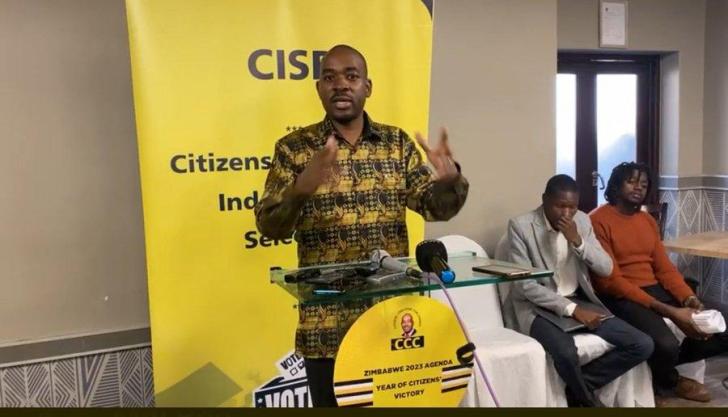News / National
Chamisa's govt won't tell lies
07 Jan 2024 at 17:33hrs |
0 Views

Nelson Chamisa, the leader of the opposition party Citizens Coalition for Change (CCC) in Zimbabwe, has expressed his commitment to a government founded on truth. He emphasised that under his leadership, Zimbabwe would operate based on truth, with no lies, propaganda, or malice.
He posted on X:
"TRUTH IN GOVERNMENT…Where we are going, Zimbabwe shall work and function on the basis of TRUTH and nothing else. The entire government, the President's office, our public officials and public institutions like ZBC shall work on TRUTH alone and nothing else. No lies. No propaganda or falsehoods. Zero hate. Nil malice. Behold the government of truth.#ForEveryone
Chamisa, who believes he won the August 2023 presidential election against President Emmerson Mnangagwa, rejected the results and called for fresh elections. However, his party's participation in by-elections to fill vacant positions has led analysts to believe that they are indirectly endorsing the previous elections.
When questioned about allegations of centralising power, Chamisa did not provide a direct response but instead asked who was making those allegations. Some of his followers were dissatisfied with his evasive answer. They stated that his evasion was unnecessary, as parts of his party's constitution indicated the centralisation of power.
Others criticised the idea of a government based solely on truth, deeming it naive. They argued that all governments employ propaganda and selective information dissemination to control their narratives. One commentator said:
"That's a farce every government uses propaganda in other words choose what to tell their people
Another one whose username on X is Patrick Masakusi pointed out that Chamisa's post itself was not truthful, claiming that it was a false foundation for his government. Patrick Masakusi said:
"The lie starts right here. Nowhere in the world you've politics without propaganda. These are promises of opposition. With assumption of power all fades away like the mist b4 the sun.
Another commentator RexNhongo @NhongoRexy referred to Chamisa's previous claim that he met Donald Trump. In 2018, Chamisa the former US President Donald Trump promised his party US$15 billion if they won the 2018 elections. Trump denied the allegations, and Chamisa later denied making those remarks, despite being recorded saying them during a rally.
The institutions mentioned in Chamisa's post, such as the government and ZBC (Zimbabwe Broadcasting Corporation), have frequently been accused of disseminating misleading information and promoting the ruling party's agenda. The government has also faced criticism for unfulfilled promises, such as free education and economic stabilisation. Government officials including Nick Mangwana, Information Secretary, have been accused of lying to the public on multiple occasions. Recently, journalist Hopewell Chin'ono accused Mangwana of lying that the failure of opposition-led local government authorities to provide essential services like sewage systems, garbage collection, and clean water was due to incompetence. Chin'ono argued that the central government had taken control of the revenue generation methods used by local authorities, making it difficult for them to fund these services properly. He stated that the central government was not allocating enough money to the local authorities, which hindered their ability to meet the public's needs.
He posted on X:
"TRUTH IN GOVERNMENT…Where we are going, Zimbabwe shall work and function on the basis of TRUTH and nothing else. The entire government, the President's office, our public officials and public institutions like ZBC shall work on TRUTH alone and nothing else. No lies. No propaganda or falsehoods. Zero hate. Nil malice. Behold the government of truth.#ForEveryone
Chamisa, who believes he won the August 2023 presidential election against President Emmerson Mnangagwa, rejected the results and called for fresh elections. However, his party's participation in by-elections to fill vacant positions has led analysts to believe that they are indirectly endorsing the previous elections.
When questioned about allegations of centralising power, Chamisa did not provide a direct response but instead asked who was making those allegations. Some of his followers were dissatisfied with his evasive answer. They stated that his evasion was unnecessary, as parts of his party's constitution indicated the centralisation of power.
Others criticised the idea of a government based solely on truth, deeming it naive. They argued that all governments employ propaganda and selective information dissemination to control their narratives. One commentator said:
"That's a farce every government uses propaganda in other words choose what to tell their people
Another one whose username on X is Patrick Masakusi pointed out that Chamisa's post itself was not truthful, claiming that it was a false foundation for his government. Patrick Masakusi said:
"The lie starts right here. Nowhere in the world you've politics without propaganda. These are promises of opposition. With assumption of power all fades away like the mist b4 the sun.
Another commentator RexNhongo @NhongoRexy referred to Chamisa's previous claim that he met Donald Trump. In 2018, Chamisa the former US President Donald Trump promised his party US$15 billion if they won the 2018 elections. Trump denied the allegations, and Chamisa later denied making those remarks, despite being recorded saying them during a rally.
The institutions mentioned in Chamisa's post, such as the government and ZBC (Zimbabwe Broadcasting Corporation), have frequently been accused of disseminating misleading information and promoting the ruling party's agenda. The government has also faced criticism for unfulfilled promises, such as free education and economic stabilisation. Government officials including Nick Mangwana, Information Secretary, have been accused of lying to the public on multiple occasions. Recently, journalist Hopewell Chin'ono accused Mangwana of lying that the failure of opposition-led local government authorities to provide essential services like sewage systems, garbage collection, and clean water was due to incompetence. Chin'ono argued that the central government had taken control of the revenue generation methods used by local authorities, making it difficult for them to fund these services properly. He stated that the central government was not allocating enough money to the local authorities, which hindered their ability to meet the public's needs.
Source - pindula
Join the discussion
Loading comments…
























